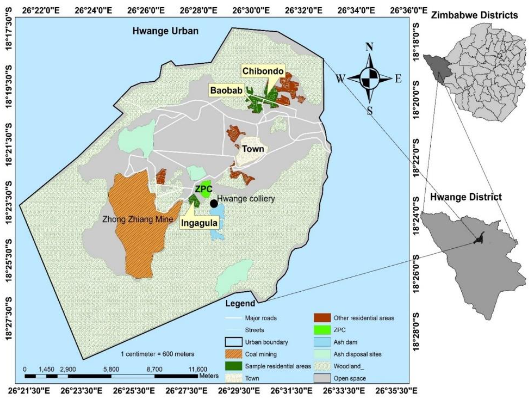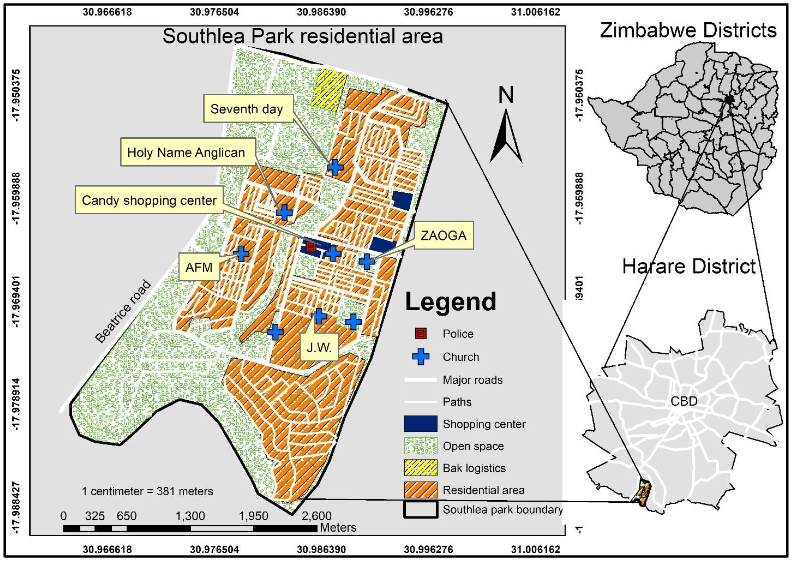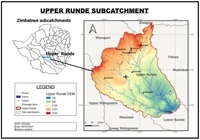Environmental challenges associated with disposal of baby diapers in Hwange town, Zimbabwe
Abstract
The rapid increase in the use of disposable baby diapers in urban areas is associated with a number of environmental challenges. This study assesses the environmental challenges of disposable baby diapers in Hwange, Zimbabwe. Questionnaires, interviews, and field observations were used for data collection in this study. Data collected from the field was analyzed using Statistical Package for Social Sciences (SPSS) version 25.0 and Microsoft Excel. The study findings show that pollution, diseases, and odours are the major challenges of poor waste management associated with disposable baby diapers in Hwange ZPC residential areas. The study recommends the involvement of responsible authorities in conscientious recycling and education on waste management. The research also recommends the need to conduct longitudinal research to establish the position of local and central government in the bid to promote a safe and healthy environment in mining towns such as Hwange, as they are overlooked.
References
[1]Ali N, Taib NM, Soon NP, Hassan O. Issues and management for used disposable diapers in solid waste in the city of Kuala Lumpur. Perentis eJournal. 2017; 7(1): 43-58.
[2]Kim KS, Kim K. Evaluation of a disposable-diaper collection trial in Korea through comparison with an absorbent-hygiene-product collection trial in Scotland. Sustainability. 2018; 10(3): 773. doi: 10.3390/su10030773
[3]Dimnwobi SK, Ekesiobi C, Madichie CV, et al. Population dynamics and environmental quality in Africa. Science of The Total Environment. 2021; 797: 149172. doi: 10.1016/j.scitotenv.2021.149172
[4]Onifade ST, Gyamfi BA, Haouas I, et al. Re-examining the roles of economic globalization and natural resources consequences on environmental degradation in E7 economies: Are human capital and urbanization essential components? Resources Policy. 2021; 74: 102435. doi: 10.1016/j.resourpol.2021.102435
[5]Onifade ST, Alola AA, Erdoğan S, et al. Environmental aspect of energy transition and urbanization in the OPEC member states. Environmental Science and Pollution Research. 2021; 28(14): 17158-17169. doi: 10.1007/s11356-020-12181-1
[6]Erdoğan S, Onifade ST, Altuntaş M, et al. Synthesizing urbanization and carbon emissions in Africa: How viable is environmental sustainability amid the quest for economic growth in a globalized world? Environmental Science and Pollution Research. 2022; 29(16): 24348-24361. doi: 10.1007/s11356-022-18829-4
[7]Dingru L, Onifade ST, Ramzan M, et al. Environmental perspectives on the impacts of trade and natural resources on renewable energy utilization in Sub-Sahara Africa: Accounting for FDI, income, and urbanization trends. Resources Policy. 2023; 80: 103204. doi: 10.1016/j.resourpol.2022.103204
[8]Onifade ST, Alola AA. Environmental quality outlook of the leading oil producers and urbanized African states. Environmental Science and Pollution Research. 2023; 30(43): 98288-98299. doi: 10.1007/s11356-023-28915-w
[9]Dyer D. Seven decades of disposable diapers. Available online: https://www.edana.org/docs/default-source/absorbent-hygiene-products/edana---seven-decades-of-diapers.pdf?sfvrsn=3e24da15_2 (accessed on 9 November 2023).
[10]EDNA. Sustainability report 2007-2008. Absorbent hygiene products. Available online: https://www.edana.org/docs/default-source/sustainability/edana-sustainability-report---2007.pdf?sfvrsn=33a7d9b3_2 (accessed on 9 November 2023).
[11]Chikwana H. Bulawayo battles housefly outbreak. Available online: https://www.chronicle.co.zw/bulawayo-battles-housefly-outbreak/ (accessed on 29 November 2023).
[12]Remigios MV. The environmental health implications of the use and disposal of disposable child diapers in Senga/Nehosho Suburb in Gweru City, Zimbabwe. Journal of Biology, Agriculture and Health Sciences. 2014; 3(2): 122-127.
[13]Ayalon O, Goldrath T, Rosenthal G, et al. Reduction of plastic carrier bag use: An analysis of alternatives in Israel. Waste Management. 2009; 29(7): 2025-2032. doi: 10.1016/j.wasman.2009.02.016
[14]Płotka-Wasylka J, Makoś-Chełstowska P, Kurowska-Susdorf A, et al. End-of-life management of single-use baby diapers: Analysis of technical, health and environment aspects. Science of The Total Environment. 2022; 836: 155339. doi: 10.1016/j.scitotenv.2022.155339
[15]Ferronato N, Nova Pinedo ML, Torretta V. Assessment of used baby diapers composting in Bolivia. Sustainability. 2020; 12(12): 5055. doi: 10.3390/su12125055
[16]EDANA. Sustainability report: Baby diapers and incontinence products. Available online: https://www.edana.org/docs/default-source/sustainability/edana-sustainability-report-baby-diapers-and-incontinence-products---2005.pdf?sfvrsn=4f8e04bd_2 (accessed on 9 November 2023).
[17]Yao Y, Ramu C, Procher A, et al. Potential for thermo-chemical conversion of solid waste in Canada to fuel, heat, and electricity. Waste. 2023; 1(3): 689-710. doi: 10.3390/waste1030041
[18]Rahat SH, Sarkar A, Rafie SAA, et al. Prospects of diaper disposal and its environmental impacts on populated urban area like Dhaka City. In: Proceedings of the 2nd International Conference on Advances in Civil Engineering (ICACE-2014); 26-28 December 2014; CUET, Chittagong, Bangladesh. pp. 26-28.
[19]Maharjan KK, Noppradit P, Techato K. Suitability of vermicomposting for different varieties of organic waste: a systematic literature review (2012-2021). Organic Agriculture. 2022; 12(4): 581-602. doi: 10.1007/s13165-022-00413-2
[20]Espinosa-Valdemar RM, Sotelo-Navarro PX, Quecholac-Piña X, et al. Biological recycling of used baby diapers in a small-scale composting system. Resources, Conservation and Recycling. 2014; 87: 153-157. doi: 10.1016/j.resconrec.2014.03.015
[21]Tembo E, Chazireni E. The Negative environmental impact of disposable diapers: The case of Mberengwa District, Zimbabwe. International Journal of Healthcare Science. 2016; 4(2): 2158-2161.
[22]Jerie S, Mandevere B. Household solid waste management: How effective are the strategies used in Harare Zimbabwe? Journal of Waste Recycling. 2020; 4(2).
[23]de Azevedo ARG, Costa AM, Cecchin D, et al. Economic potential comparative of reusing different industrial solid wastes in cementitious composites: a case study in Brazil. Environment, Development and Sustainability. 2021; 24(4): 5938-5961. doi: 10.1007/s10668-021-01630-7
[24]Mutowo J, Mzengi J. Practices regarding disposal of soiled diapers among women of child bearing age in poor resource urban setting. IOSR Journal of Nursing and Health Science. 2015; 4(4): 63-67.
[25]Ogwueleka T. Municipal solid waste characteristics and management in Nigeria. Journal of Environmental Health Science & Engineering. 2009; 6(3): 173-180.
[26]Masocha M, Tevera DS. Open waste dumps in Victoria Falls Town: Spatial patterns, environmental threats and public health implications. Geographical Journal of Zimbabwe. 2002; 33-34: 9-19.
[27]Sani S, Zimucha T. Municipal solid waste management practices: Towards adoption of a responsible innovative model for the city of Harare. Journal of Research and Innovation for Sustainable Society. 2022; 4(2): 110-128. doi: 10.33727/jriss.2022.2.12: 110-128
[28]Matamanda AR, Mphambukeli TN, Chirisa I. Exploring water-gender-health nexus in human settlements in Hopley, Harare. Cities & Health. 2022. doi: 10.1080/23748834.2022.2136557
[29]Manatsa D, Mushore TD, Gwitira I, et al. Revision of Zimbabwe’s Agro-Ecological Zones. Ministry of Higher and Tertiary Education, Innovation, Science and Technology Development; 2020.
[30]Rogers CML. A Woody Vegetation Survey of Hwange National Park. Department of National Parks and Wildlife Management, Zimbabwe; 1993.
[31]World Population Review. Population of cities in Zimbabwe. Available online https://worldpopulationreview.com/countries/cities/zimbabwe (accessed on 9 November 2023).
[32]Fetters MD, Curry LA, Creswell JW. Achieving integration in mixed methods designs—Principles and practices. Health Services Research. 2013; 48(6pt2): 2134-2156. doi: 10.1111/1475-6773.12117
[33]Creswell JW, Clark VLP, Gutmann ML, Hanson WE. Advanced mixed. In: Tashakkori AM, Teddlie CB (editors). Handbook of Mixed Methods in Social & Behavioral Research. SAGE Publications, Inc.; 2003.
[34]Creswell JW. Reflections on the MMIRA: The future of mixed methods task force report. Journal of Mixed Methods Research. 2016; 10(3): 215-219. doi: 10.1177/1558689816650298
[35]Creswell JW. A Concise Introduction to Mixed Methods Research. University of Nebraska; 2015. pp. 45-88.
[36]Braun V, Clarke V. Using thematic analysis in psychology. Qualitative Research in Psychology. 2006; 3(2): 77-101. doi: 10.1191/1478088706qp063oa
[37]Wambui KE, Muchiri J, Makindi S. Soiled diapers disposal practices among caregivers in poor and middle-income urban settings. International Journal of Scientific Research Publications. 2015; 5(10): 2250-3153.
[38]Mathe M. Environmental pollution-perceptions and views on usage and disposal of diapers: A case study of Gwanda Urban. International Journal of Innovative Science and Research Technology. 2018; 3(5): 2456-2569.
[39]Schenck CJ, Chitaka TY, Tyrrell H, et al. Disposable diaper usage and disposal practices in Samora Machel Township, South Africa. Sustainability. 2023; 15(12): 9478. doi: 10.3390/su15129478
[40]Ogwueleka T. Municipal solid waste characteristics and management in Nigeria. Journal of Environmental Health Science & Engineering. 2009; 6(3): 173-180.
Copyright (c) 2023 Kudakwashe Muringaniza, Karen Madhara, Tatenda Musasa, Oshneck Mupepi

This work is licensed under a Creative Commons Attribution 4.0 International License.
Authors contributing to this journal agree to publish their articles under the Creative Commons Attribution 4.0 International License, allowing third parties to share their work (copy, distribute, transmit) and to adapt it for any purpose, even commercially, under the condition that the authors are given credit. With this license, authors hold the copyright.










